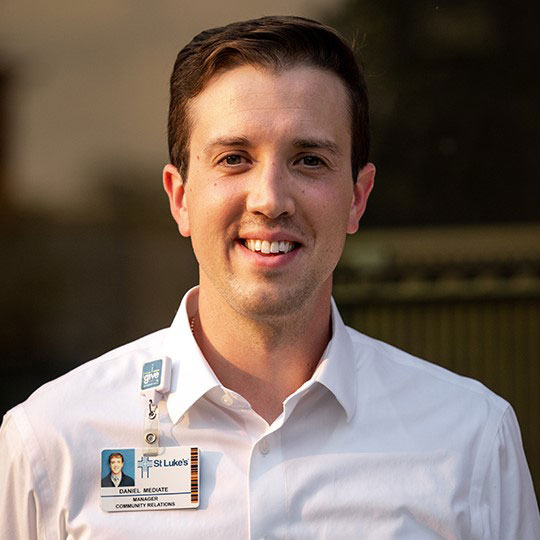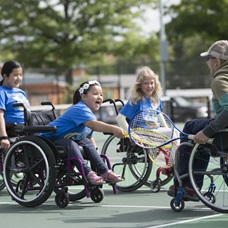Better Together
‘Show up, listen and care’: How The Mentoring Network, St. Luke’s partner to support kids


Donna Shines believes everyone should have a mentor, regardless of their station in life.
The benefits of a mentoring relationship — like friendship and support — Shines argues, can have near-countless positive effects that last lifetimes.
“Mentoring is just the coolest thing,” she said. “We all need mentors.”
Shines is acutely aware of those benefits, as the executive director of The Mentoring Network.
The nonprofit organization in Nampa connects adults with volunteer opportunities to mentor children and youth in school settings. St. Luke’s has awarded multiple Community Health Improvement Fund grants to power its efforts over the last few years.
When COVID-19 hit Idaho, The Mentoring Network had about 175 active matches in schools. As school districts shut their doors to try to prevent the spread, the organization collaborated with school officials, kids, families and mentors to stay connected virtually or through old-fashioned physical mail.
“Keeping mentors and kids connected has been challenging during the pandemic,” Shines said. “It is one match at a time, one school at a time, one person as a time giving us the ‘OK’ to get something happening.”
The pandemic has magnified the need for kids to have supportive adults in their lives.
A recent report from the Centers for Disease Control and Prevention showed a sharp increase in mental health-related emergency department visits among children during much of 2020.
Positive and supportive social interactions can be a “protective factor” to promote childhood well-being, said St. Luke’s community health manager Jean Fitzgerald-Mutchie, who has worked closely with Shines and the organization.
“A trusted adult is one of the most important resilience promoting factors in a child’s life, and Donna and the volunteers at The Mentoring Network live that in action,” Fitzgerald-Mutchie said. “By ensuring children have a consistent and trusted adult they can count on, lives and futures are being changed, and generations to come will feel the impact.”
A growing organization
In 2004, Shines took over the organization, formerly known as the West Canyon Mentoring Project, following 12 years as a special education teacher. Seventeen years ago, it worked with 17 schools and 24 matches of kids and mentors. It has since grown to 60 schools in Nampa, Caldwell (including Vallivue), Parma and Homedale — all while keeping a staff of just two.
School counselors identify kids who might benefit from having a mentor. They check with Shines to see if any potential volunteers are available. If so, the counselor connects with the child and their family for approval and invites the child to participate as a mentee.
“Every school counselor who sees a child that may be invisible, a child who they think really needs a person to show up, listen and care, I tell them to keep a wish list,” Shines said. “Do not tell kids about it; I want the mentor waiting, not the child waiting to be matched. How special for the child to be invited into something?”
Typically, mentors — who are trained and vetted by the organization — visit schools for about an hour each week to meet with the children. That, of course, has changed since last March.
“We are not tutors, we are not parents, we are not counselors,” Shines said. “We are a friend coming alongside, for as long as that child wants.”

A model of success
The Mentoring Network has supported nearly 800 kids with mentors since 2000. About 650 adults have volunteered over that time, many building long-term friendships.
For several years, St. Luke’s has provided grants to help the organization meet its goal of growing its total number of kids served by 5-10% annually.
The Mentoring Network’s approach has proven successful, too. It recently reported that 99% of actively mentored youth have stayed out of the juvenile justice system and 99% graduated from high school.
“It’s not anything magic,” said Shines, who recently gave a virtual presentation on mentoring to an international audience.
“All these kids want is someone to show up, listen and care. It’s pretty simple.”
What’s next for supporting kids
Shines dreams of a two-year-long waiting list of mentors ready to step in for a child in need.
“Wouldn’t that be cool?” she asked. “Every time I get a call, it’s just like, ‘Bam, let’s make it happen.’”
Shines is working daily to help kids and their mentors link. She also has an eye toward the future, as families and communities try to put back the pieces in, hopefully, a post-pandemic world.
“We want so many more good people who come to us and want to be mentors when we are through the pandemic,” she said. “There is going to be such a huge need for kids. We don’t know what they’ve heard and seen and experienced. School is going to be second on their mind. They need compassion and love to begin with.”
About The Author

Daniel Mediate works in the St. Luke’s Communications department.


